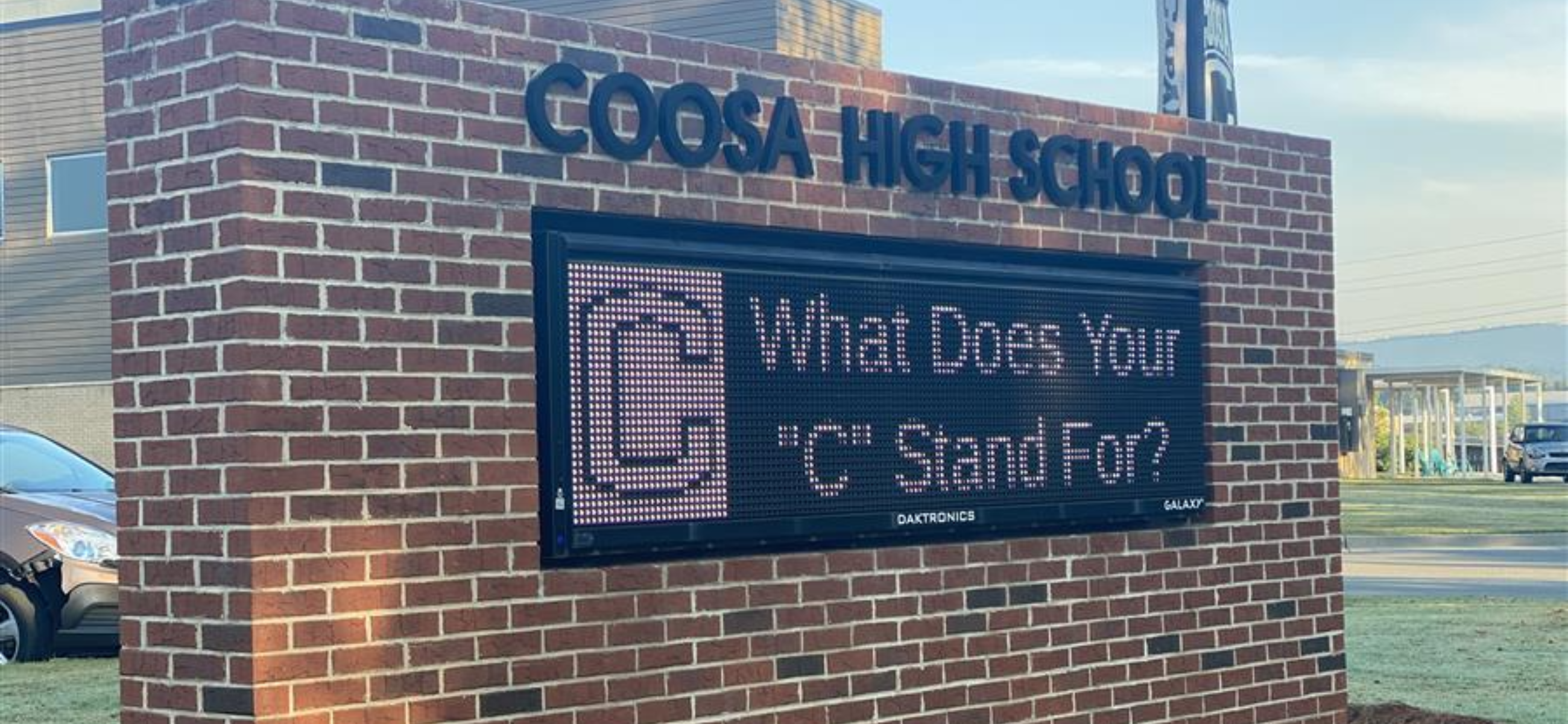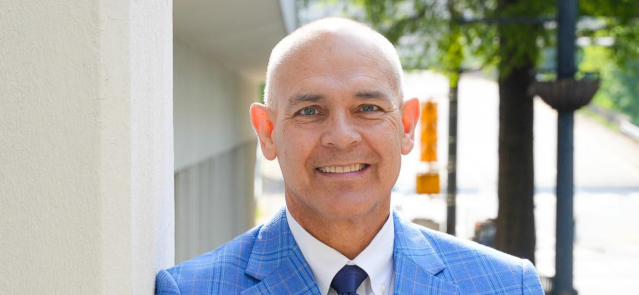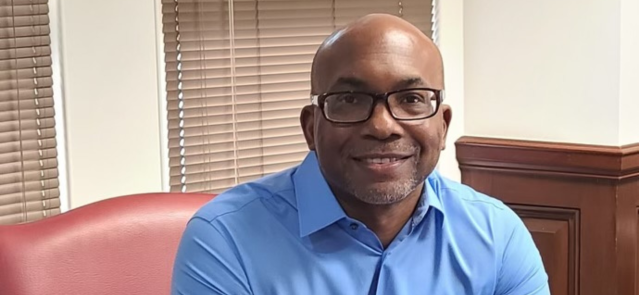Stay ahead of the curve as a political insider with deep policy analysis, daily briefings and policy-shaping tools.
Request a DemoRace bias case advances on First Amendment merit

The sign in front of Coosa High School in Floyd County. (Credit: Coosa High School)
- A federal judge rules parts of a case involving Black high school students can go to trial if both sides can’t reach a resolution
- Case centers on Black students’ rights to protest and wear ‘Black Lives Matter’ shirts
- The First Amendment case puts school administrators “on notice,” attorney says
A federal judge’s recent decision to allow parts of a civil rights lawsuit involving Black high school students in northwest Georgia to go to trial over their right to wear Black Lives Matter shirts is a warning to school administrators nationwide, the students’ attorney said on Monday.
“The case we have is pretty big. It’s a landmark case,” Atlanta attorney Harry M. Daniels told State Affairs. “Because it puts a lot of people on notice, especially across the United States, as well as the state of Georgia and other states in the South, that this type of behavior will not be tolerated.”
Daniels is representing the parents of five Black Coosa High School students who two years ago sued the Floyd County School district. Four of the five students have since graduated.
U.S. District Judge Leigh Martin May wants attorneys for the students and the Floyd County school system to mediate the case. If that fails, it goes to court, which is likely to be sometime next year, Daniels said.
Floyd County School District spokesperson Brooke Brombelow told State Affairs the district does not comment on pending litigation.
The lawsuit was filed in May 2022 in the U.S. District Court for the Northern District of Georgia after four of the five students were suspended for participating in an anti-racism protest held across the street from the public school. The suspension was the latest in a string of racial harassment incidents the students allege they endured during their time in high school.
The lawsuit states that the students were subjected to:
- A reenactment of George Floyd’s murder in a school hallway.
- A student wearing a Confederate flag belt and addressing Black students as “slaves.”
- A white student brandishing what appeared to be a whip and informing Black students that “we used to whip you with this.”
- White students’ open use of racial slurs.
The lawsuit challenges “Coosa High’s deliberate indifference to acts of racial animosity toward Black students perpetrated by white students and teachers; as well as the school’s viewpoint of discrimination in its dress code and the inconsistent administration of disciplinary policies to the detriment of Black students.”
According to the lawsuit, the students were forced to turn their T-shirts inside out because the shirts carried symbols associated with the Black Lives Matter movement, including an image of George Floyd,who was killed by Minneapolis police, sparking national protests. Meanwhile, white students at Coosa High were allowed to wear belts, hoodies and hats bearing the image of the Confederate flag, the lawsuit states.
Coosa is an unincorporated community in northwest Georgia’s Floyd County, home of conservative congresswoman Marjorie Taylor Greene.
May’s ruling comes on the heels of another controversy involving state Schools Superintendent Richard Woods who last week reversed his decision not to include or fund an advanced placement African American Studies course among the state’s curriculum offerings. The class is now a part of Georgia’s high school curriculum list and will be funded by the state.
Daniels said the case is not likely to be affected by America’s current culture war which has social and political groups sparring over differing ideologies.
“Our case is kind of on its own track, dealing specifically with discrimination and dealing with the First Amendment because one of the issues is the retaliation for engaging in a peaceful protest,” Daniels said, adding that a top school administrator’s assertion that students who participated in the protest would be suspended “was a violation of their First Amendment rights.”
“Our case has attracted a lot of national attention,” said Daniels. “This case is dealing with school administrators. These school administrators do not want to go to trial … and be asked uncomfortable questions.”
At its core, the case is about democracy and First Amendment rights, Daniels said. Students were protesting what they considered long-standing racist treatment and, under the law, he said, they have the right to freedom of speech, including expressing views on their clothing and to protest peacefully.
“Even at a school level, school administrators don’t have the authority to shut down democracy and freedom,” he said. “The issue is how do you [on the other hand] allow somebody to wear a rebel flag that represents slavery, oppression and hate?”
Bruce Thompson, transformative Georgia labor commissioner and former state senator, dies at 59
ATLANTA, Nov. 25, 2024 — Bruce Thompson, Georgia’s labor commissioner and a dedicated public servant known for his transformative leadership and open-door policy, passed away yesterday after a battle with pancreatic cancer. He was 59. Thompson, a former Republican state senator and military veteran, was elected labor commissioner in 2022. He took office in January …
Newly minted Senate Minority Leader Harold Jones II: ‘I’m not the typical back-slapping politician’
Nearly 10 years into legislative life, Sen. Harold Jones II wouldn’t change anything about the experience. “I love every minute of it. Even when I hate it, I love it,” the 55-year-old Augusta Democrat told State Affairs. Come January, Jones will add another role to his legislative duties: Senate minority leader, a job held for …
Gov. Kemp calls on state agencies to be fiscally restrained amid record $16.5B surplus
The Gist Gov. Brian Kemp asked the state’s 51 government agencies for continued fiscal restraint when drafting their amended fiscal year 2025 and 2026 budgets. Most agencies adhered to his request even as the state’s general fund surplus hit a record $16.5 billion last month. Forty-five agencies, excluding state courts, followed the governor’s instructions to …
Georgia defies bomb threats as election chief declares a “free, fair and fast” vote amid record turnout
ATLANTA – Despite dealing with over 60 bomb threats, Georgia’s election chief said Tuesday the state’s general election went smoothly. Georgia had a record turnout with nearly 5.3 million people voting, Secretary of State Brad Raffensperger told reporters. Election officials in the state’s 159 counties have until 5 p.m. to certify votes. “We had a …




